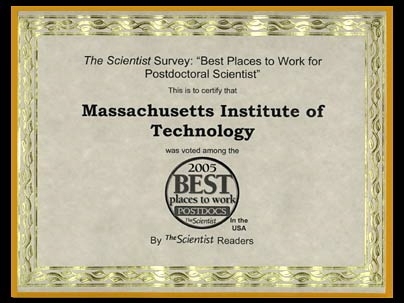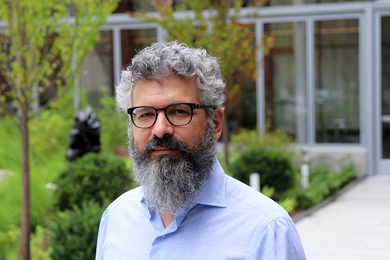MIT was ranked third among U.S. academic institutions and 13th overall among U.S. universities, government and private research institutions in the annual survey, "Best Places to Work for Postdocs," published Feb. 14 by The Scientist. This is the magazine's third annual survey of work environments for postdoctoral associates and fellows.
A valuable training experience, access to research equipment and library resources, and a good mentoring relationship were the key ingredients of a great workplace, according to the 3,500 postdocs in the life sciences who completed surveys about programs in 123 U.S. institutions and 66 non-U.S. institutions.
"It is very gratifying to have MIT's rich and exciting research environment reflected in this honor. Postdoctoral scholars are such an integral part of our university. We are proud of their accomplishments and pleased to provide a productive and enjoyable work environment," said Alice P. Gast, the Robert T. Haslam Professor of Chemical Engineering, and vice president for research and associate provost at MIT. "We have benefited greatly from our work with the Postdoctoral Scholars Advisory Council in our ongoing efforts to address funding and other issues affecting their experiences here."
Survey respondents used an "agree/strongly disagree scale" to rank statements about their workplace and experience in quality of training, mentoring, communication, facilities and family and personal life. Financial matters, including funding, compensation, equity and health insurance, were also addressed.
Twelve of the top 15 U.S. institutions in the survey have an association or advisor for postdoctoral scholars that helps raise awareness of their needs. MIT, which has more than 800 postdoctoral scholars, established its Postdoctoral Scholars Advisory Council in 2003.
"This recognition speaks to the dedication of the Postdoctoral Scholars Advisory Council, administrators and staff who are working to improve the postdoc experience at MIT. Last year MIT was not even in the Top 15 in this survey," said Penny Beuning, a postdoctoral associate in the Department of Biology and a member of the council. "The postdoc council has made great progress in a short time to improve the conditions for postdocs at MIT, including establishing a mentoring program, improving benefits for postdoc fellows, and sponsoring several social events to help build community."
The editor of The Scientist, Richard Gallagher, noted that most respondents were unhappy with some aspects of their work environment and institutions. He said he hoped the survey results would also be a "challenge to all institutions to continuously improve working conditions for postdocs, arguably science's most valuable players."
The University of North Carolina at Chapel Hill, and Washington University in St. Louis, Mo., were ranked first and second, respectively, by the postdocs who completed surveys.
A version of this article appeared in MIT Tech Talk on February 16, 2005 (download PDF).






